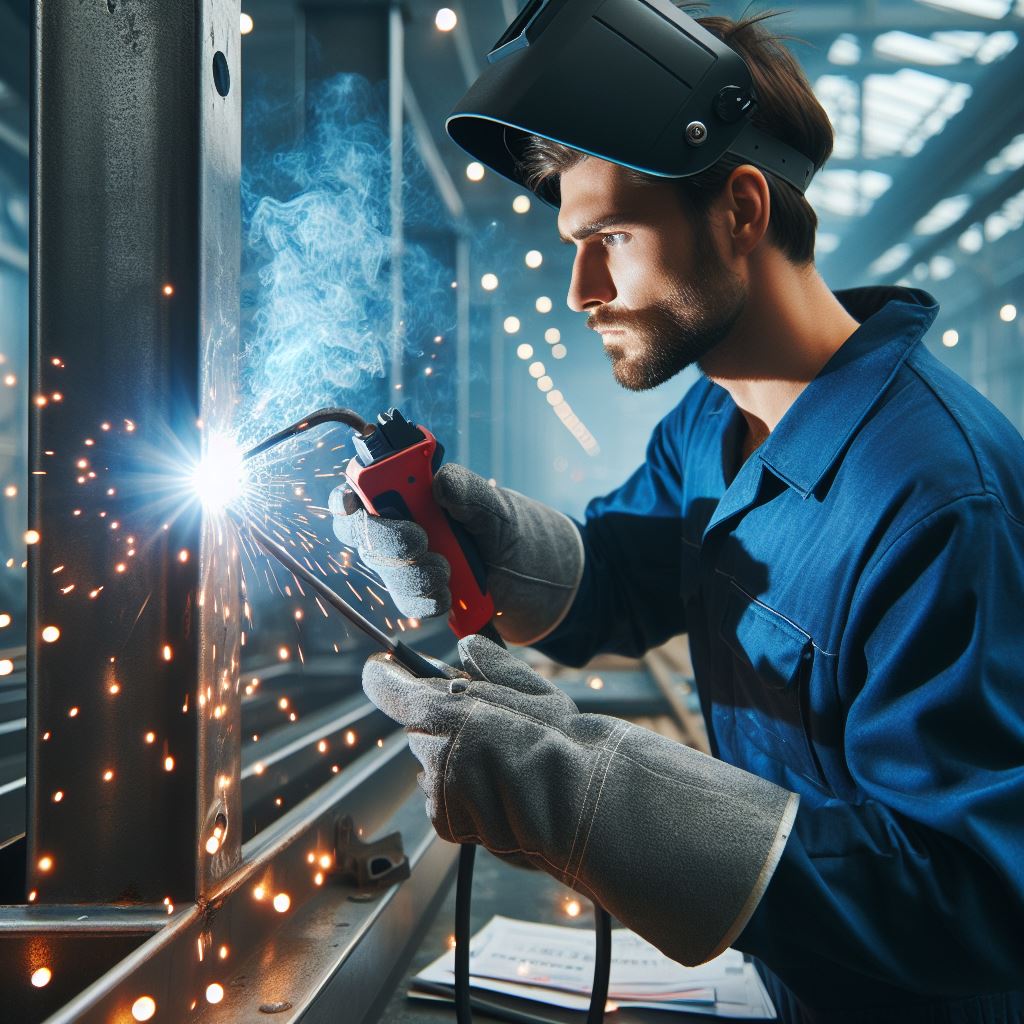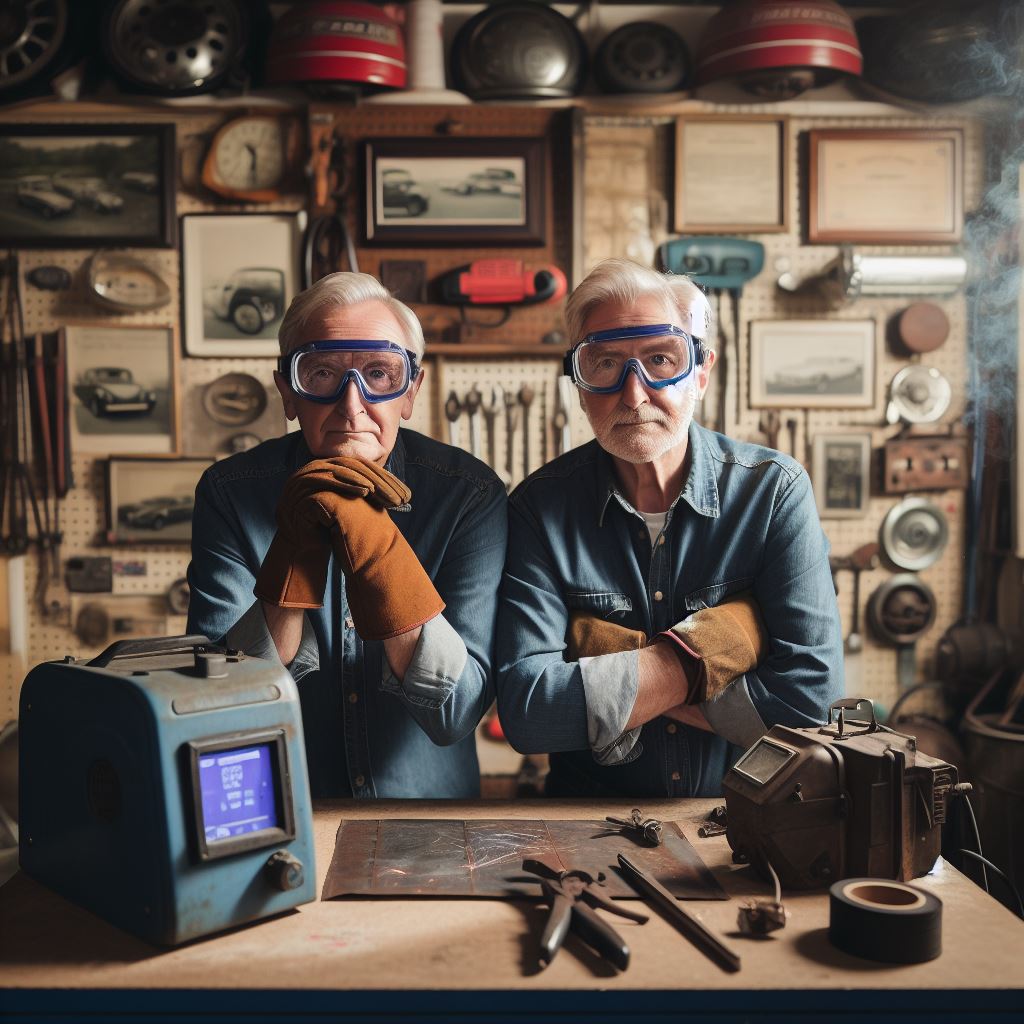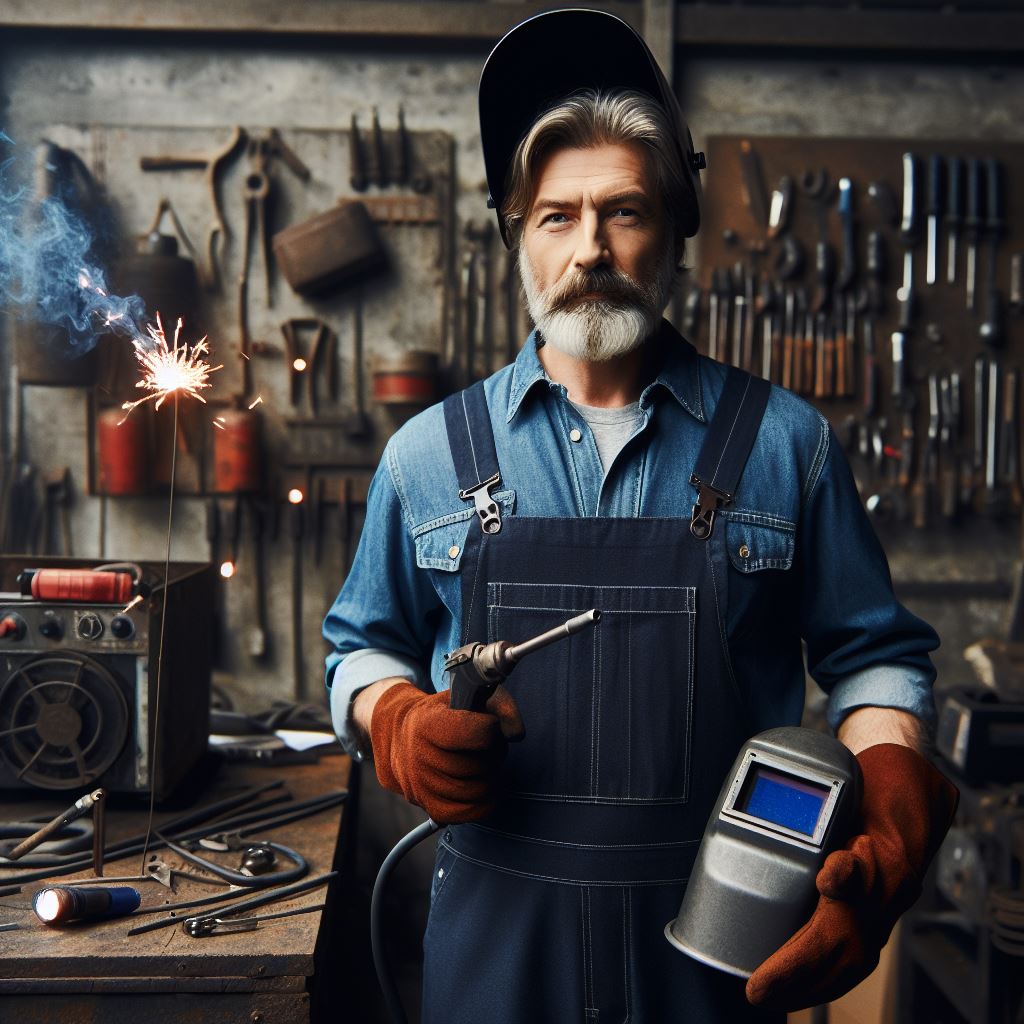Introduction
Welding is a vital process that joins metals together using heat or pressure. It plays a significant role in various industries, making welding jobs in the UK crucial for their smooth functioning and development.
The demand for welding jobs in the UK is steadily increasing. As the manufacturing sector expands and infrastructure projects grow, skilled welders are in high demand.
From construction to automotive and aerospace industries, welding jobs are sought after.
Skilled welders play a pivotal role in ensuring the structural integrity and safety of buildings, bridges, and other infrastructure.
Their expertise is also crucial in the manufacturing of vehicles, machinery, and various metal products.
Industries like oil and gas, shipbuilding, and power generation heavily rely on skilled welders for maintenance, repairs, and installation of pipelines, vessels, and equipment.
Without skilled welders, these industries would suffer significant delays and safety concerns. The importance of skilled welders goes beyond the industrial sector.
They also contribute to the arts and design industry, creating metal sculptures and installations that enhance public spaces and add aesthetic value.
In general, welding jobs in the UK are essential for various industries. The demand for skilled welders is rising, and their role in ensuring structural integrity, safety, and development is highly valued.
From manufacturing to infrastructure and even art, welding plays a vital role in shaping our world.
Overview of different types of welding processes
Welding is a vital skill in various industries, including construction, manufacturing, and automotive. There are several types of welding processes, each offering unique benefits and applications.
In this section, we will explore some of the most commonly used welding techniques in the UK.
Gas Metal Arc Welding (GMAW)
GMAW, also known as MIG welding, is widely used due to its versatility and ease of use. It involves the use of a consumable wire electrode and a shielding gas to create a strong weld.
GMAW is suitable for both thin and thick materials, making it popular in automotive and general fabrication.
Shielded Metal Arc Welding (SMAW)
SMAW, commonly called stick welding, is one of the oldest and most straightforward welding techniques.
Personalized UK Career Consulting
Receive tailored career guidance designed just for you. Get actionable steps and expert support to boost your career in 1-3 days. Take control of your career now.
Get StartedIt uses a flux-coated electrode that melts during the welding process, forming a protective shield around the molten metal. SMAW is preferred for outdoor applications and works well on rusty or dirty surfaces.
Flux-Cored Arc Welding (FCAW)
FCAW is similar to GMAW but uses a tubular wire filled with flux instead of a solid wire. The flux creates a shielding gas when heated, protecting the weld from atmospheric contamination.
FCAW is ideal for thick materials and is commonly used in shipbuilding and construction projects.
Gas Tungsten Arc Welding (GTAW)
GTAW, also known as TIG welding, is a precise and high-quality welding process. It uses a non-consumable tungsten electrode and an inert gas to shield the weld area.
GTAW is suitable for welding thin materials and offers exceptional control over the heat input, making it popular in aerospace and artistry.
Submerged Arc Welding (SAW)
SAW is primarily used for welding thick materials or in heavy-duty applications. It involves the creation of an arc between a continuously fed wire electrode and the workpiece.
The weld area is completely submerged in a granular flux, providing excellent protection and high deposition rates.
Plasma Arc Welding (PAW)
PAW is similar to GTAW but uses a constricted arc and a different gas mixture, resulting in a higher energy density.
It is commonly used for welding reactive metals and alloys with intricate joints or high precision requirements. PAW finds applications in industries such as electronics and aerospace.
Final Thoughts
Understanding the different types of welding processes is crucial for anyone considering a career in welding or seeking welding services.
Each method has its strengths and limitations, and choosing the right technique depends on the project’s requirements and materials involved.
As technology advances, new welding processes are continually emerging, offering enhanced efficiency and weld quality.
Whether you are a professional welder or someone interested in the welding industry, expanding your knowledge about different welding techniques can help you make informed decisions and excel in your field.
Read: Best Tools Every UK Plumber Should Have
Your Dream Job Starts with a Perfect CV
Get a tailored CV and cover letter that captures your unique strengths and stands out in your industry. Let us help you make an unforgettable first impression.
Get StartedWelding jobs in the construction industry
Welding jobs in the construction industry offer various opportunities for skilled individuals in the UK. These roles are crucial for ensuring the structural integrity of buildings and infrastructure projects.
Welders play a vital role in construction projects by using different welding techniques to join metal pieces and create secure and durable connections.
Here are some key aspects of welding jobs in the construction industry:
1. Welding jobs in the construction industry
- Structural welders: These professionals specialize in welding various structural components of buildings, bridges, and other large-scale construction projects.
- Pipeline welders: They focus on welding pipes that are used for water supply, gas distribution, and oil transportation in construction projects.
- Sheet metal workers: These welders work with thin metal sheets to create ductwork, ventilation systems, and other specialized components in construction.
- Welding inspectors: These professionals verify the quality and compliance of welding processes and materials used in construction projects.
2. Role of welders in construction projects
- Joining metal components: Welders use their skills to join metal pieces together, ensuring a secure and robust connection.
- Reading blueprints: Welders interpret and follow construction blueprints and welding specifications to determine the exact requirements for each project.
- Ensuring safety: Welders adhere to strict safety measures to prevent accidents and ensure the well-being of themselves and others at the construction site.
- Collaborating with other tradespeople: Welders work closely with other construction professionals, such as engineers, architects, and fabricators, to ensure precise execution of welding techniques.
3. Welding techniques used in construction
- Shielded Metal Arc Welding (SMAW): Also known as stick welding, this technique uses a flux-coated electrode to create an electric arc for joining metal pieces.
- Gas Metal Arc Welding (GMAW): Commonly referred to as MIG (Metal Inert Gas) welding, it utilizes a wire electrode and a shielding gas to produce a strong weld.
- Flux-Cored Arc Welding (FCAW): Similar to GMAW, FCAW employs a tubular wire electrode with flux inside, providing additional protection and increased productivity.
- Gas Tungsten Arc Welding (GTAW): Known as TIG (Tungsten Inert Gas) welding, it uses a non-consumable tungsten electrode and shielding gas to create precise and high-quality welds.
4. Importance of structural integrity in buildings
- Safety: Properly welded structures ensure the safety of occupants, as they can withstand various loads and forces without failure.
- Durability: Welded connections provide long-lasting strength, allowing structures to resist corrosion, weathering, and other environmental factors.
- Aesthetics: Well-executed welding techniques contribute to the overall appearance of a building, providing clean and seamless joints.
- Cost-efficiency: Welded structures often require minimal maintenance and repair, reducing long-term expenses for property owners.
In essence, welding jobs in the construction industry are vital for ensuring the structural integrity of buildings and infrastructure projects in the UK.
Welders play a crucial role in construction projects, using different welding techniques to join metal components securely.
Their expertise, along with adherence to safety measures, collaboration with other professionals, and understanding of blueprints, ensures the successful execution of welding tasks.
With a focus on structural integrity, these jobs contribute to the safety, durability, aesthetics, and cost-efficiency of construction projects in the UK.
Read: Plumbing Apprenticeships in the UK 101
Welding jobs in the automotive industry
The automotive industry offers various welding jobs that require different techniques and skills.
Listed below are some welding jobs available in the automotive industry:
- Welding Technician: These professionals are responsible for fabricating parts and welding materials used in the automotive manufacturing process.
- Robotic Welding Operator: Robotic systems are often used in automotive manufacturing, and operators are needed to program and operate these machines.
- Quality Control Inspector: These inspectors ensure that welded components meet the required standards and specifications.
- Welder-Fabricator: These professionals work on both welding and fabricating processes to create custom automotive parts.
- MIG Welder: MIG (Metal Inert Gas) welding is commonly used in the automotive industry and requires skilled welders to join metals efficiently.
Welding techniques used in automotive manufacturing
- MIG Welding: This technique uses a wire electrode to create strong and precise welds, commonly used for automotive sheet metal.
- TIG Welding: TIG (Tungsten Inert Gas) welding is used for high-quality welds on stainless steel and aluminum parts.
- Resistance Spot Welding: This technique involves applying pressure and electric current to fuse metal sheets together efficiently.
- Laser Welding: Laser beams are used to create precise and strong welds, often used for lightweight automotive components.
- Friction Stir Welding: This technique joins materials by generating heat through friction, commonly used for aluminum components.
Welders play a crucial role in ensuring vehicle safety:
- They are responsible for welding critical components like structural frames and chassis, which need to withstand various stresses.
- Proper welding techniques and inspections help ensure that vehicles meet safety standards.
- Welders also repair damaged parts, reinforcing the structural integrity of vehicles and ensuring their safe operation.
Precision and aesthetics are essential in automotive welding:
- Precision welding ensures accurate alignment of components and reduces the risk of structural failure.
- Aesthetically pleasing welds enhance the overall appearance of vehicles and contribute to customer satisfaction.
- Automotive manufacturers often have strict quality standards, demanding precise and visually appealing welds.
- Proper surface preparation and post-weld treatments also contribute to the durability and aesthetics of the welds.
In review, the automotive industry offers a wide range of welding jobs that require various techniques and skills. Welders play a crucial role in ensuring vehicle safety and meeting quality standards.
Precision and aesthetics are also important factors in automotive welding, contributing to both performance and customer satisfaction.
Optimize Your LinkedIn for Success
Boost your LinkedIn profile with a professional bio, keyword-rich headline, and strategic recommendations that attract recruiters. Stand out from the crowd and get noticed.
Optimize NowRead: The Future of Plumbing in the UK Explored

Welding Jobs in the Aerospace Industry
When it comes to the aerospace industry, welding plays a vital role in aircraft manufacturing. The high-quality welding techniques used in this sector ensure the safety and reliability of every flight.
High-Quality Welding Required for Aircraft Manufacturing
- The aerospace industry demands welding of the highest quality due to the critical nature of aircraft components.
- Welders need to possess exceptional skills and knowledge to meet the industry’s stringent requirements.
- Structural integrity and durability are crucial in aircraft, and welding plays a significant role in achieving these qualities.
- Welders must ensure the strength and stability of various parts, such as fuselages, wings, and engine components.
- Flawless welds are essential to maintain the structural integrity of an aircraft throughout its lifespan.
Precision Welding Techniques Used in Aerospace Industry
The aerospace industry relies on precision welding techniques to meet the industry’s specific needs.
- TIG welding (tungsten inert gas) is commonly used for its precision and control over the welding process.
- Micro welding, a highly specialized technique, is vital for welding small and delicate aerospace components.
- Laser welding is also utilized to ensure accuracy and minimize heat damage to sensitive materials.
- Large-scale aerospace manufacturing increasingly utilizes automated welding systems for consistent quality and accuracy.
- Robotics and automated processes allow for faster production while maintaining precision and reducing human error.
Importance of Meeting Strict Industry Standards and Regulations
The aerospace industry operates under strict standards and regulations to ensure the highest level of safety.
- Welders working in the aerospace industry must adhere to specific welding codes and standards.
- Meeting these industry regulations is essential to guarantee the structural integrity of aircraft.
- Welding inspections and quality controls are regularly conducted to ensure compliance with industry standards.
- Continuous professional development and certifications are crucial for welders to stay updated with the latest industry requirements.
- The aerospace industry prioritizes safety and reliability, demanding welders to perform their tasks with utmost precision and attention to detail.
Generally, welding jobs in the aerospace industry require exceptional skills, precision techniques, and the ability to meet strict industry standards.
Welders play a crucial role in ensuring the safety and reliability of aircraft through high-quality welding.
Continuous advancements in technology contribute to the efficient production of aerospace components, while strict regulations guaranteeing compliance and safety remain a top priority.
Read: UK Plumber Training: What You Need to Know
Welding Jobs in the Manufacturing Industry
In the manufacturing industry, welding plays a crucial role in the production process. Here are some types of welding jobs available in the UK:
1. Welding Jobs in Manufacturing
- Manufacturing companies often require skilled welders for various tasks.
- Welders work with metals to create or repair products used in the manufacturing process.
- These jobs may include working with steel, aluminum, or other materials.
- Welding jobs in manufacturing can range from assembly line production to custom fabrication.
2. Use of Robotic Welding Systems in Manufacturing Processes
- In recent years, there has been an increasing trend towards the use of robotic welding systems.
- Robotic welders are highly efficient and can perform precise welds with minimal supervision.
- High-volume production environments commonly use these systems.
- Robotic welding jobs require operators to program, maintain, and monitor the machines.
3. Specialized Welding Techniques for Different Manufacturing Requirements
- Certain manufacturing processes require specialized welding techniques.
- For example, aerospace manufacturers often rely on TIG (Tungsten Inert Gas) welding for its high-quality welds.
- Other industries may require specific techniques like MIG (Metal Inert Gas) or stick welding.
- Specialized welding jobs cater to these unique manufacturing requirements.
4. Role of Welders in Ensuring Product Quality and Efficiency
- Welders play a vital role in maintaining product quality and efficiency.
- They ensure proper welding techniques are used to achieve strong and durable welds.
- Defective welding can lead to structural weaknesses, compromising the integrity of the final product.
- Skilled welders are responsible for conducting quality checks and repairs as necessary.
Basically, the manufacturing industry in the UK offers a range of welding jobs. These jobs encompass various tasks, from assembly line welding to specialized techniques catering to specific manufacturing requirements.
Furthermore, the use of robotic welding systems is becoming increasingly prevalent, requiring skilled operators to program and maintain these machines.
Regardless of the specific welding job, welders play a crucial role in ensuring product quality and efficiency.
Opportunities for Welders in the UK
When it comes to welding jobs, the UK offers a wide range of opportunities for skilled individuals.
Job Prospects and Growth in the Welding Field
The demand for welders continues to grow in the UK, creating numerous job prospects in various industries.
- Manufacturing sector: Welders are needed in industries such as automotive, aerospace, and construction.
- Oil and gas industry: Welders play a crucial role in maintaining and repairing offshore platforms.
- Infrastructure development: Welding skills are required in the construction of bridges, roads, and buildings.
- Renewable energy sector: Welding is essential in the installation and maintenance of wind turbines and solar panels.
The growth of these industries ensures continuous opportunities for welders to secure stable employment.
Average Salaries and Benefits for Welders in the UK
Welding jobs in the UK offer competitive salaries and attractive benefits packages.
- Entry-level welders can expect to earn an average salary of £20,000 to £25,000 per year.
- With experience, salaries can increase to £30,000 or more.
- Additional benefits may include paid holidays, pension schemes, and healthcare coverage.
- Some companies also offer training and development programs to enhance skills and provide career progression.
The combination of competitive salaries and benefits make welding jobs in the UK financially rewarding.
Possibilities for Career Advancement and Specialization
Welders in the UK have various opportunities to advance their careers and specialize in specific areas.
- Advanced welding techniques: Skilled welders can specialize in advanced techniques such as TIG welding or robotic welding.
- Supervisory roles: Experienced welders can move up the career ladder and become welding supervisors or inspectors.
- Welding engineering: Further education and training can lead to a career in welding engineering, involving design and process development.
- Self-employment: Some welders choose to establish their own businesses and work independently on a contract basis.
Continual learning and upgrading skills can open doors to higher positions and increased earning potential.
Essentially, the welding industry in the UK offers a plethora of opportunities for skilled welders.
- Job prospects are abundant in various sectors, including manufacturing, oil and gas, infrastructure, and renewable energy.
- Competitive salaries, benefits, and career advancement possibilities make welding jobs financially and professionally rewarding.
- Welders can specialize in advanced techniques, move into supervisory roles, pursue welding engineering, or establish their own businesses.
If you have a passion for welding, the UK is undoubtedly a promising destination to embark on your welding career.
Conclusion
There are various types of welding jobs available in the UK, including MIG welding, TIG welding, and arc welding.
Skilled welders are highly important in industries such as construction, manufacturing, and automotive.
The demand for welding professionals is steadily increasing, offering great career opportunities for those interested in pursuing welding careers in the UK.
Welding offers a stable and rewarding career path, with the chance to work on exciting projects and contribute to the development of the country’s infrastructure.
Skilled welders enjoy competitive salaries and robust job security, as multiple industries actively seek their expertise.
With proper training and certification, individuals can enhance their skills and become qualified welders, opening doors to a wide range of employment opportunities.
A career in welding might be ideal for you if you have a passion for metalwork and enjoy problem-solving.
By obtaining the necessary qualifications and gaining experience, you can establish yourself as a professional welder and embark on a successful and fulfilling career in the UK.
Don’t hesitate to take the first step if you’re interested in pursuing a welding career. The UK offers a vibrant and thriving welding industry, providing numerous prospects for growth and job satisfaction.
Start your journey today and become a skilled welder contributing to the nation’s infrastructure and economy.
[E-Book for Sale]
500 Cutting-Edge Tech Startup Ideas for 2024 & 2025: Innovate, Create, Dominate
$19.99 • 500 Tech Startup Ideas • 62 pages
You will get inspired with 500 innovative tech startup ideas for 2024 and 2025, complete with concise descriptions to help you kickstart your entrepreneurial journey in AI, Blockchain, IoT, Fintech, and AR/VR.




